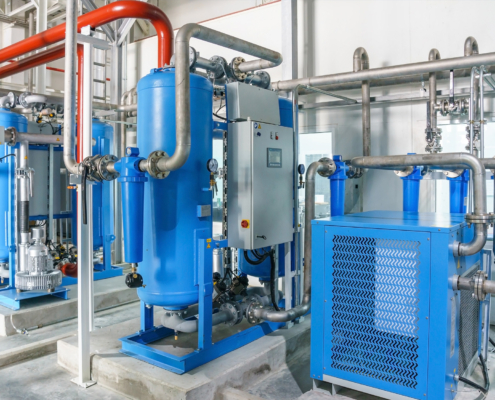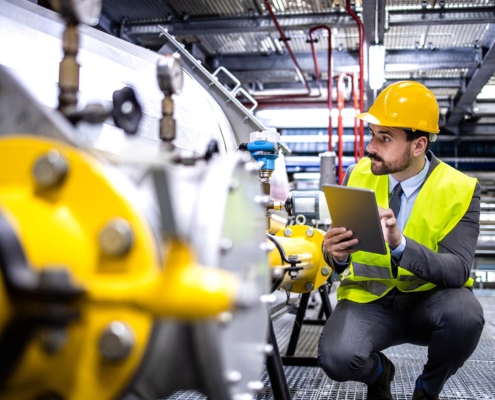 https://pioneerair.com/wp-content/uploads/2024/05/Choosing-Replacement-Desiccant-Air-Dryers-Pitfalls-to-Avoid.jpg
1250
2000
Abstrakt Marketing
/wp-content/uploads/2022/05/pioneer_air_systems_logo.png
Abstrakt Marketing2024-05-09 20:47:392026-01-16 20:43:36Choosing Replacement Desiccant Air Dryers: Pitfalls to Avoid
https://pioneerair.com/wp-content/uploads/2024/05/Choosing-Replacement-Desiccant-Air-Dryers-Pitfalls-to-Avoid.jpg
1250
2000
Abstrakt Marketing
/wp-content/uploads/2022/05/pioneer_air_systems_logo.png
Abstrakt Marketing2024-05-09 20:47:392026-01-16 20:43:36Choosing Replacement Desiccant Air Dryers: Pitfalls to AvoidCompressed CO2 vs. Compressed Air: Choosing the Right Compressed Gas for Your Facility
Compressed gases play a vital role in various processes in industrial and manufacturing settings. Compressed air and compressed carbon dioxide (CO2) are two commonly used compressed gases. Each of these gases has its own set of advantages and disadvantages, and selecting the right one for your specific facility is crucial for optimizing performance and efficiency.
In this blog, we will explore the differences between compressed air and compressed CO2, the benefits and drawbacks of each, and how to decide which is best suited for your facility’s unique needs.
Analyzing Compressed CO2
Compressed CO2, also known as carbon dioxide gas or liquid CO2, is a compressed gas used in various industrial applications. It is typically produced by compressing gaseous CO2 to high pressures. Compressed CO2 has its own unique set of benefits and drawbacks:
Advantages of Compressed CO2
- Clean and Inert: Compressed CO2 is a clean and inert gas, making it ideal for applications where contamination or chemical reaction with the compressed gas is a concern.
- High Purity: CO2 gas can be produced to high purity levels, suitable for applications in the food and beverage industry, medical sector, and electronics manufacturing.
- Low Environmental Impact: CO2 is a greenhouse gas, but when used in closed-loop systems, its environmental impact can be minimized, making it an eco-friendly option.
- Easy Transportation and Storage: Compressed CO2 can be transported and stored in high-pressure cylinders, making it convenient for facilities with limited infrastructure.
Drawbacks of Compressed CO2
- Limited Versatility: Compressed CO2 is not as versatile as compressed air and is primarily used for specific applications such as welding, fire suppression, and carbonation of beverages.
- Safety Concerns: Handling high-pressure CO2 cylinders requires careful safety measures due to the potential risks associated with pressure release.
- Energy Consumption: Compressing CO2 to high pressures can be energy-intensive, similar to compressed air.

Understanding Compressed Air
Compressed air is a widely used and versatile compressed gas in various industries. It is created by compressing atmospheric air to a specific pressure level using compressors. Compressed air is valued for its ease of use, availability, and the ability to power a wide range of tools and equipment.
The Benefits of Compressed Air
- Versatility: Compressed air is incredibly versatile and can be used for many applications, from powering pneumatic tools and machines to providing clean and dry air for manufacturing processes.
- Accessibility: Since it is derived from atmospheric air, compressed air is readily available, making it convenient for many facilities without additional gas storage or supply systems.
- Cost-Efficiency: Compressed air systems can be relatively cost-effective to set up and maintain, especially for facilities that already have access to electricity.
- Energy Storage: Compressed air can serve as an energy storage medium, allowing for energy-efficient recovery and reuse when integrated into energy management systems.
- Reliability: Compressed air systems are known for their reliability and long-lasting performance when properly maintained.
Cons of Compressed Air
- Energy Intensive: Compressing air consumes a significant amount of energy, making it less efficient compared to other energy sources for certain applications.
- Leakage: Compressed air systems are prone to leaks, resulting in energy wastage and increased operational costs.
- Moisture and Contaminants: Compressed air can contain moisture and contaminants, which need to be removed for sensitive applications, requiring additional filtration and drying equipment.
Understanding which compressed gas to use is vital for any facility. Be sure to also stay up to date on safety considerations throughout the gas purification process by reading this helpful blog.
Choosing the Right Compressed Gas for Your Facility
Now that we’ve explored the benefits and drawbacks of compressed air and CO2, how do you decide which is best for your specific facility? The choice largely depends on the nature of your operations, the specific applications, and your facility’s infrastructure. Here are some key factors to consider:
Application Requirements
Start by assessing the requirements of your applications. Compressed air is suitable for various applications, while CO2 is more specialized. Compressed air may be the better choice if your operations involve pneumatic tools, pneumatic conveyance, or air-powered equipment. On the other hand, if you require a clean and inert gas for applications like welding, food processing, or medical use, compressed CO2 may be the ideal option.
Energy Efficiency
Consider the energy consumption of each gas. Compressed air systems can be less energy-efficient due to the energy required for compression. If energy efficiency is a priority for your facility, you may need to implement energy-saving measures such as variable speed drives and leak detection for compressed air systems.
Environmental Impact
Evaluate your facility’s environmental goals. Compressed CO2, when used responsibly and in closed-loop systems, can have a lower environmental impact compared to compressed air, which requires electricity for compression.
Infrastructure and Equipment
Assess your facility’s infrastructure and existing equipment. If your facility already has a compressed air system in place, it may be more cost-effective to continue using compressed air for additional applications. Conversely, if you have specific requirements for clean, high-purity gas, investing in a compressed CO2 system may be necessary.
Safety Considerations
Both compressed air and CO2 can be hazardous if mishandled. Ensure that your facility has the necessary safety measures and training in place for handling and storing high-pressure gases.
Pioneer Air Systems: An Industry-Leading Provider of Compressed CO2 and Compressed Air
At Pioneer Air Systems, we take pride in being the nation’s premier source for compressed CO2 and compressed air solutions. With a track record of unmatched expertise and a commitment to innovation, we deliver top-quality gases tailored to your industrial needs. Our extensive range of products and exceptional customer service make us the preferred choice for businesses seeking reliable and efficient compressed gas solutions. Reach out to our team of experts to get started today.
Related Postings
 https://pioneerair.com/wp-content/uploads/2024/05/Choosing-Replacement-Desiccant-Air-Dryers-Pitfalls-to-Avoid.jpg
1250
2000
Abstrakt Marketing
/wp-content/uploads/2022/05/pioneer_air_systems_logo.png
Abstrakt Marketing2024-05-09 20:47:392026-01-16 20:43:36Choosing Replacement Desiccant Air Dryers: Pitfalls to Avoid
https://pioneerair.com/wp-content/uploads/2024/05/Choosing-Replacement-Desiccant-Air-Dryers-Pitfalls-to-Avoid.jpg
1250
2000
Abstrakt Marketing
/wp-content/uploads/2022/05/pioneer_air_systems_logo.png
Abstrakt Marketing2024-05-09 20:47:392026-01-16 20:43:36Choosing Replacement Desiccant Air Dryers: Pitfalls to Avoid https://pioneerair.com/wp-content/uploads/2024/05/A-Guide-to-Desiccant-Types-Applications-and-Lifespans.jpg
1250
2000
Abstrakt Marketing
/wp-content/uploads/2022/05/pioneer_air_systems_logo.png
Abstrakt Marketing2024-05-09 20:39:292026-01-16 20:43:36A Guide to Desiccant Types, Applications, and Lifespans
https://pioneerair.com/wp-content/uploads/2024/05/A-Guide-to-Desiccant-Types-Applications-and-Lifespans.jpg
1250
2000
Abstrakt Marketing
/wp-content/uploads/2022/05/pioneer_air_systems_logo.png
Abstrakt Marketing2024-05-09 20:39:292026-01-16 20:43:36A Guide to Desiccant Types, Applications, and Lifespans https://pioneerair.com/wp-content/uploads/2024/03/Professional-inspecting-industrial-gas-system.jpg
1250
2000
Abstrakt Marketing
/wp-content/uploads/2022/05/pioneer_air_systems_logo.png
Abstrakt Marketing2024-03-04 14:44:192026-01-16 20:43:37Maintenance 101: Keeping Your Gas Hydrogen Dryer System in Peak Condition
https://pioneerair.com/wp-content/uploads/2024/03/Professional-inspecting-industrial-gas-system.jpg
1250
2000
Abstrakt Marketing
/wp-content/uploads/2022/05/pioneer_air_systems_logo.png
Abstrakt Marketing2024-03-04 14:44:192026-01-16 20:43:37Maintenance 101: Keeping Your Gas Hydrogen Dryer System in Peak Condition


